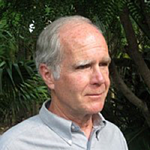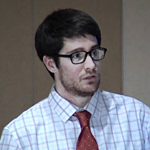Cancer isn't caused by a single event or exposure, but a collection of conditions or events that produces cancer in an individual person or cancer patterns in populations. That means there are multiple opportunities and strategies for preventing or “disrupting” accumulation of these contributing causes—in individuals and populations—before cancer develops.
Using an eco-social model, Dr. Ted Schettler addressed the web of causation of cancer in populations, and multi-level opportunities for prevention. Dr. Todd Whitehead focused on environmental exposures and an example of cancer, childhood leukemia, including some surprising examples of risk factors, including paternal smoking before conception, home remodeling, air pollution, chemical solvents and certain pesticides. He highlighted examples from “Stephen’s story,” a chapter in the award-winning A Story of Health eBook and continuing education course, which has recently been updated with the latest science.
Featured Speakers
 Ted Schettler, MD, MPH, is the Science Director of Science and Environmental Health Network (SEHN). He received his MD from Case-Western Reserve University and a master's degree in public health from the Harvard School of Public Health. He practiced medicine for many years in New England. Ted has worked extensively with community groups and non-governmental organizations throughout the US and internationally, addressing many aspects of human health and the environment. He has served on advisory committees of the US EPA and National Academy of Sciences.
Ted Schettler, MD, MPH, is the Science Director of Science and Environmental Health Network (SEHN). He received his MD from Case-Western Reserve University and a master's degree in public health from the Harvard School of Public Health. He practiced medicine for many years in New England. Ted has worked extensively with community groups and non-governmental organizations throughout the US and internationally, addressing many aspects of human health and the environment. He has served on advisory committees of the US EPA and National Academy of Sciences.
Ted is co-author of Generations at Risk: Reproductive Health and the Environment, which examines reproductive and developmental health effects of exposure to a variety of environmental toxicants; In Harm's Way: Toxic Threats to Child Development; Environmental Threats to Healthy Aging: With a Closer Look at Alzheimer' and Parkinson's Diseases, and; A Story of Health eBook and continuing education course. He is the author of The Ecology of Breast Cancer: The Promise of Prevention and the Hope for Healing.
Among many others, Ted's current projects include active participation in the Health Care Without Harm coalition, contributing to its international campaign to improve the environmental performance of hospitals and other healthcare institutions. Ted and SEHN often work in collaboration with colleagues from other organizations.
 Todd P. Whitehead, PhD, has a Bachelor’s degree in Civil Engineering from the University of Virginia and a Master’s degree in Environmental Engineering from the University of North Carolina-Chapel Hill. In the spring of 2011 he received his PhD in Environmental Health Sciences from the UC Berkeley School of Public Health. Currently, Todd is an Assistant Researcher and a Lecturer at UC Berkeley. He is involved in the identification of environmental risk factors for childhood leukemia, as part of the Center for Integrative Research on Childhood Leukemia and the Environment, a Children’s Environmental Health Center. Todd is an exposure scientist and his focus is in evaluating the utility of measurement techniques for characterizing chemical exposures in human health studies. His PhD dissertation dealt with estimating environmental exposures to indoor contaminants using residential-dust samples.
Todd P. Whitehead, PhD, has a Bachelor’s degree in Civil Engineering from the University of Virginia and a Master’s degree in Environmental Engineering from the University of North Carolina-Chapel Hill. In the spring of 2011 he received his PhD in Environmental Health Sciences from the UC Berkeley School of Public Health. Currently, Todd is an Assistant Researcher and a Lecturer at UC Berkeley. He is involved in the identification of environmental risk factors for childhood leukemia, as part of the Center for Integrative Research on Childhood Leukemia and the Environment, a Children’s Environmental Health Center. Todd is an exposure scientist and his focus is in evaluating the utility of measurement techniques for characterizing chemical exposures in human health studies. His PhD dissertation dealt with estimating environmental exposures to indoor contaminants using residential-dust samples.
This webinar was moderated by Maria Valenti, Director of the Commonweal Health and Environment Literacy Project (HELP). It lasted for 45 minutes and was recorded for our call and webinar archive.
